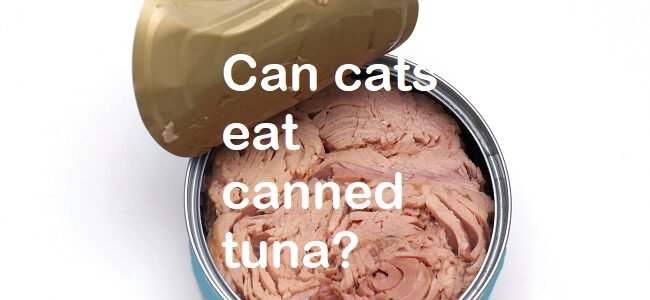Cats are among the most common pets worldwide, and their popularity is well deserved. Not only are they adorable, but they also have a reputation for being very independent and low-maintenance. Many cat owners have a crucial question: Can cats eat canned tuna?
The short answer is Yes, Canned Tuna is safe to feed cats.
 Many adopt cats because they don’t think they have the time or energy to care for a more high-maintenance pet like a dog.
Many adopt cats because they don’t think they have the time or energy to care for a more high-maintenance pet like a dog.
But even though cats may be relatively easy to take care of, that doesn’t mean they don’t require any care at all.
Read on to learn more about this question and other important things about feeding your feline friend.
Wild Caught Canned Tuna in Water (Top 10 Picks)
| PRODUCT | FEATURES | RATING | CHECK PRICE | |
|---|---|---|---|---|
 | Starkist Chunk Light Tuna in Water | Product of China | 4.8 |  |
 | Chicken of the Sea Chunk Light Tuna in water | Product of Thailand Low salt | 4.5 |  |
 | Ahi Yellowfin Tuna Pouches | Mercury tested Sustainably caught No additives | 4.5 |  |
 | Polar Chunk Light Tuna | Dolphin safe No additives | 4.6 |  |
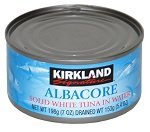 | Kirkland Albacore Solid White Tuna | Hook & line caught Dolphin safe Product of Thailand | 4.5 |  |
 | Safe Catch Elite | Mercury tested | 4.6 |  |
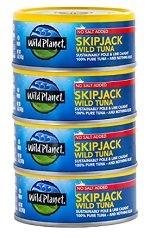 | Skipjack Wild Tuna | Dolphin & turtle safe Canned in USA | 4.6 |  |
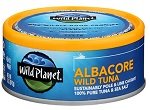 | Wild Planet Albacore Tuna | 3rd party mercury tested Processed in Vietnam | 4.6 |  |
 | Wild Planet Skipjack Tuna | Pole & line caught No fillers Processed in Vietnam | 4.6 |  |
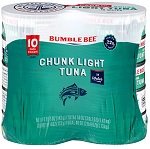 | Bumble Bee Chunk Light Tuna in Water | Canned in USA Dolphin safe | 4.6 |  |
What is Canned Tuna?
Canned tuna is a type of fish processed and sealed in a can. It is a popular food item because it is affordable and has a long shelf life. The term “canned tuna” can refer to several different types of fish, including bluefin, albacore, yellowfin, and skipjack.
Tuna is a nutritious food that is high in protein and low in fat. It is also a good source of omega-3 fatty acids, which are beneficial for heart health.
Canned Tuna comes in two types which are oil-packed tuna and water-packed tuna. Oil-packed tuna is canned tuna packed in olive oil or vegetable oil. It has a richer flavor and is more expensive than water-packed tuna.
Water-packed tuna, as the name suggests, is packed in water. It is less expensive than oil-packed tuna but has a milder flavor safe for cat consumption- unlike oil-packed tuna, which is not safe for cats to eat.
Benefits of Canned Tuna for Cats
Canned tuna can be a healthy and nutritious treat for cats. It is high in protein and low in fat, which makes it an excellent source of nutrition for cats. Additionally, canned tuna is a good source of omega-three fatty acids, which have many health benefits.
Some of the benefits of feeding canned tuna to your cat include:
- Improved heart health
- Reduced inflammation
- Increased cognitive function
- Better joint health
Is Canned Tuna Safe For Cats?

Yes, canned tuna is safe for cats to eat. Cats are obligate carnivores, meaning that they require animal protein to survive. Tuna is a popular choice for many cat owners because it is an affordable source of animal protein.
However, there are some potential risks associated with feeding tuna to cats. The most significant concern is that canned tuna can be high in mercury.
Mercury is picked up by small fish in polluted waters. Larger fish eat the small fish and the mercury passes to their bodies. Being high on the food chain, large predatory pelagic fish such as tuna are sometimes found to have high mercury levels in their bodies.
Mercury is a toxic heavy metal that can cause neurological damage in humans and animals. In large enough quantities, mercury can be fatal. For this reason, it is essential to exercise caution when feeding canned tuna to cats.
If you choose to feed your cat canned tuna, select a product marked “low mercury” or “no mercury added”. You should also limit the amount of tuna you feed your cat, as too much fish can lead to nutritional imbalances.
When used in moderation, canned tuna can be a healthy part of your cat’s diet. Just be sure to choose a low-mercury variety and feed it in moderation.
How to Feed Canned Tuna to Cats
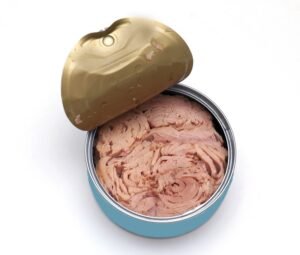
When feeding canned tuna to your cat, it is essential to do so in moderation. Too much tuna can lead to health problems such as mercury poisoning.
Canned tuna should not be the only source of protein in your cat’s diet. Feeding your various cat proteins is essential to ensure they are getting all the nutrients they need.
Additionally, you should not feed kittens, or cats that are pregnant or nursing, with canned tuna. Kittens and pregnant or nursing cats have a higher risk of mercury poisoning.
If you are going to feed canned tuna to your cat, it is essential to choose a high-quality product. Look for canned tuna packed in water and contains no added salt or other ingredients. Avoid feeding your cat canned tuna packed in oil, as this can harm their health.
When feeding canned tuna to your cat, start with a small amount and see how they react. If they seem to enjoy it and have no adverse reaction, you can continue feeding it to them in moderation.
Canned tuna is a safe and healthy treat that cats can enjoy. When feeding canned tuna to your cat, it is essential to do so in moderation and choose a high-quality product. Nevertheless, canned tuna can be a nutritious and delicious treat that your cat will love.
Feeding Your Cats with Raw or Cooked Tuna

There are benefits to both raw and cooked diets for cats. Proponents of raw diets argue that cats are obligate carnivores and that their digestive system is designed to digest and utilize nutrients from animal flesh and organs.
They also claim that the high temperatures in cooking destroy many of the nutrients found in meat, making cooked diets a lousy choice for cats.
However, there are also several benefits to feeding cats cooked diets. Cooked meat is easier to digest, meaning that cats are better able to absorb the nutrients from their food.
In addition, cooked diets eliminate the risk of bacteria contamination, which can sometimes occur with raw meat. Ultimately, the decision of whether to feed your cat raw or cooked food is a personal one.
There are benefits to both types of diet, and it ultimately comes down to what you feel is best for your pet.
4 Tuna Cat Food Products (Our Top Picks)
| PRODUCT | RATING | CHECK PRICE ON AMAZON | CHECK PRICE ON CHEWY | |
|---|---|---|---|---|
 | Fancy Feast Flaked | 4.6 |  | |
 | Purina One Recipe | 4.5 |  | |
 | Wellness Minced | 4.6 |  | |
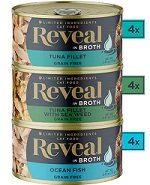 | Reveal in Broth | 4.4 |  |
Conclusion- Can cats eat canned tuna?

While canned tuna is safe for cats in moderation, there are a few things to keep in mind. First, look for tuna that is packed in water rather than oil.
Second, avoid tuna that has been flavored or seasoned, as this can contain ingredients that are harmful to cats. Finally, don’t overfeed your cat canned tuna, as it is high in mercury and can cause health problems if consumed in large quantities.
However, when fed in moderation as part of a balanced diet, canned tuna can be a healthy and delicious treat for your feline friend.
A Final Word
Cat Food Advisor is privately owned. We do not accept money, samples, gifts, or other incentives in exchange for special consideration in preparing our reviews.
However, we do receive a referral fee from online retailers, like Chewy or Amazon (at no extra cost to you) when readers click over to their websites from ours. This helps cover the cost of operation of our free blog. Thanks for your support.
For more information, please visit our Disclaimer and Disclosure page.

